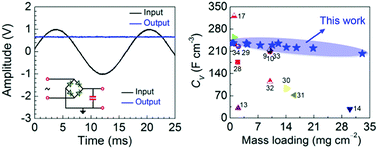How Electrochemical Capacitors Work
A solid liquid or gel electrolyte covers the surface. Electrochemical capacitors also usually called supercapacitors are of great interest as high power electrochemical energy storage devices due to the fact that they combine high power density with long cycle life and wide operational temperature range properties that are currently unattainable in li ion batteries.

Grafting Of Quinones On Carbons As Active Electrode

Pdf Electrochemical Properties Of Pani As Single Electrode

Manganese Oxide Graphene Oxide Composites For High Energy
Batteries have two electrical terminals electrodes separated by a chemical substance called an electrolyte.
How electrochemical capacitors work. However this double layer has no conventional solid dielectric to separate the charges. Electrochemical capacitors use the double layer effect to store electric energy. In a way a capacitor is a little like a battery.
Although they work in completely different ways capacitors and batteries both store electrical energy. When you switch on the power chemical reactions happen involving both the electrodes and the electrolyte. Batteries electrochemical capacitors ecs can operate at high charge and discharge rates over an almost unlimited number of cycles and enable energy recovery in heavier duty systems.
This oxide layer acts as the dielectric of the capacitor. Like all capacitors ecs also called super capacitors or ultracapacitors because of their extraordinarily high capacitance density physically store charge. If you have read how batteries work then you know that a battery has two terminals.
An electrolytic capacitor occasionally abbreviated e cap is a polarized capacitor whose anode or positive plate is made of a metal that forms an insulating oxide layer through anodization. Ecs are electrochemical energy sources with high power delivery and uptake with an exceptional cycle life. Electrochemical capacitors ecs sometimes referred to as electric double layer capacitors also appear under trade names like supercapacitor or ultracapacitor the phrase double layer refers to their physically storing electrical charge at a surface electrolyte interface of high surface area carbon electrodes.
Electrochemical capacitors provide a mode of electrical charge and energy storage and delivery complementary to that by batteries. There are two storage principles in the electric double layer of the electrodes that contribute to the total capacitance of an electrochemical capacitor. Like all capacitors ecs also called supercapacitors or ultracapacitors because of their extraordinarily high capacitance density physically store charge.
They are used when high power demands are needed such as for power buffer and power saving units but are also of great interest for energy recovery. Batteries and capacitors do a similar jobstoring electricitybut in completely different ways. Patent in 1957 to becker but was of a crude nature employing porous carbon.
Inside the battery chemical reactions produce electrons on. Unlike batteries electrochemical capacitors ecs can operate at high charge and discharge rates over an almost unlimited number of cycles and enable energy recovery in heavier duty systems. The first electrochemical capacitor device was disclosed in a general electric co.
Applications of electrochemical capacitors.

Highly Amorphous Pbo2 As An Electrode In Hybrid

Robust Graphene Composite Films For Multifunctional

Low Dimensional Carbon And Mxene Based Electrochemical

Supercapacitor Wikipedia

Hybrid Nanostructured Materials For High Performance

Ppt Electrochemical Capacitors Ecs Technology

Electrochemical Supercapacitors For Energy Storage And
Investigation Of Synergy Between Electrochemical Capacitors
New Materials And New Configurations For Advanced

Graphene Based Electrochemical Capacitors With Integrated

Supercapacitor Wikipedia

Supercapacitor Wikipedia
Comments
Post a Comment